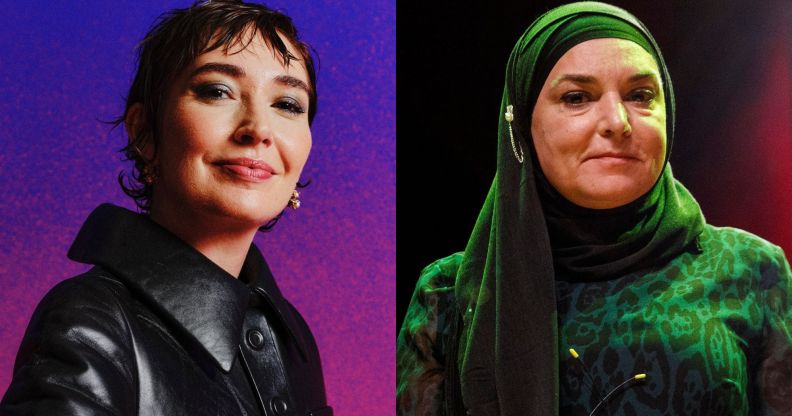Nothing Compares director explains why Sinéad O’Connor will be remembered as a queer icon

Nothing Compares documentary maker Kathryn Ferguson and queer icon Sinéad O’Connor. (Vivek Vadoliya/Getty)
Kathryn Ferguson, the director behind Nothing Compares, the award-winning Sinéad O’Connor documentary, has told PinkNews why the Irish singer will always be seen as an LGBTQ+ icon.
Ferguson’s documentary, which was released in January 2022 – 18 months before O’Connor’s death at age 56 this July – traces the Grammy-Award-winning artist and activist’s life between 1987 and 1993.
Between those years, O’Connor released her critically acclaimed debut album The Lion and the Cobra, but was ultimately exiled from mainstream pop stardom after ripping up a photo of Pope John Paul II on Saturday Night Live in 1993, in protest against child sexual abuse in the Catholic Church.
Members of the LGBTQ+ community had long since stood by O’Connor, both in admiration of her fearlessness, and in solidarity with her as someone who was ostracised for living what she believed.
Speaking exclusively to PinkNews, Ferguson – who has just been announced as one of 2023’s BAFTA Breakthrough cohort, thanks at least in part for her work on Nothing Compares – explained why she believes O’Connor’s affinity with the queer community ran so deep.
“She was an absolute ally. From the very get-go, when she was a teenager arriving in London in the late 80s, the community that she immersed herself in was the queer community,” Ferguson said.
“It was [filmmakers] John Maybury, it was Jerry Stafford. It was this amazing bunch of incredible creative souls. She was a huge HIV activist – anytime she got the chance to speak about the crisis, she did.”
In 1990, O’Connor took part in the fundraising album Red Hot + Blue, which raised nearly a million dollars for direct action group ACT UP. The organisation fought to improve the lives of those living with Aids, and to change legislation and the public perception of the illness.
In the music video for her song on the album, a cover of Cole Porter’s “You Do Something to Me”, recorded with Maybury, O’Connor is seen standing in a room surrounded by people wearing black clothes and holding candles.
At the end, the phrases “Silence = Death” and “Action = Life” appear on the screen.
“It’s worth watching [the] video, because I think that says it all,” Ferguson added.
“I’ve seen archives of her at award ceremonies where she stood up and spoke very candidly about the Aids crisis, and why there needed to be awareness and why there shouldn’t be any stigma.”
But O’Connor’s allyship extended far beyond Aids. In 1988, just one month after Margret Thatcher passed the reviled Section 28 law, banning the “promotion” of homosexuality in schools, the singer headlined a Pride event.
In 2017, she donated clothes and unused make-up to trans youth in Ireland, via the charity Transgender Equality Network Ireland.
“She kept showing up and she kept doing it,” Ferguson said. “People really felt that.”
Ferguson is one of 42 BAFTA breakthrough recipients. The 2023 accolade, supported by Netflix, has been given to “must-watch” creatives working in film, games and television, from across the UK, US and India.
Other recipients this year include The Last of Us star Bella Ramsey, Dreaming Whilst Black writer and star Adjani Salmon and Blue Jean actress Rosy McEwen and director Georgia Oakley.
To learn more about HIV and Aids research, testing and treatment, visit amFAR or the Terrence Higgins Trust.
How did this story make you feel?

